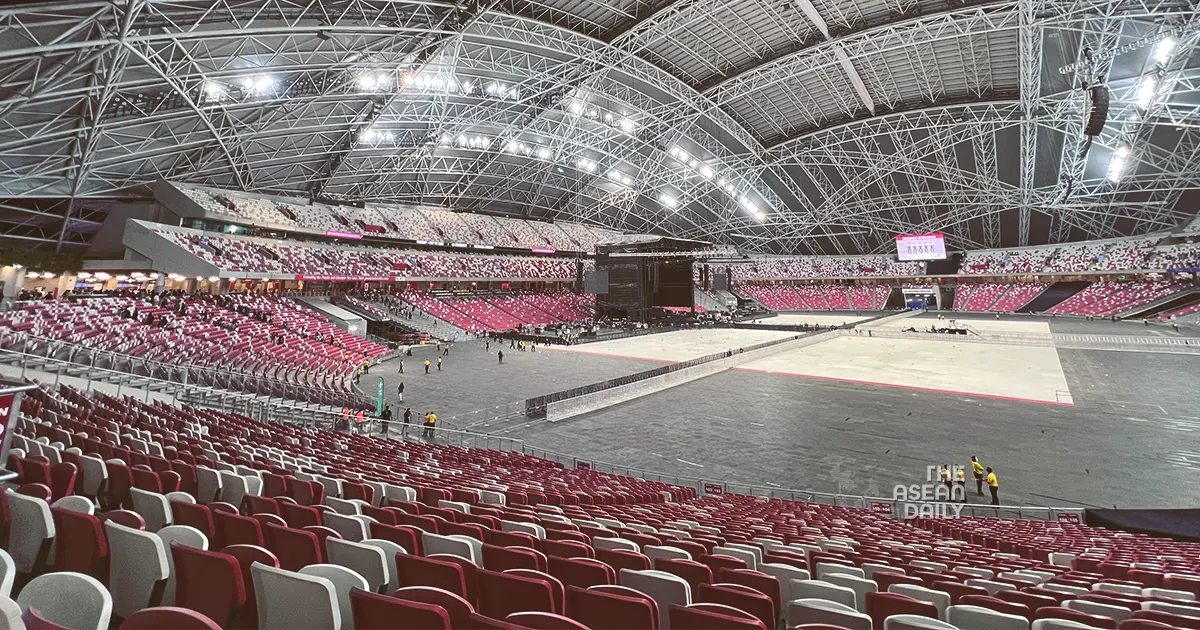22-10-2023 (SINGAPORE) Known for its excellent infrastructure, seamless connectivity, and a remarkable track record in hosting large-scale events, Singapore has solidified its status as a coveted stop on concert tours for international artists. It’s no exaggeration to say that Singapore has earned a reputation akin to a luxury brand that guarantees a flawless performance and a fantastic time, not just for the audience but also for the celebrities and the entire touring crew.
Gabriela Chan, the marketing manager of concert promoter CK Star Entertainment in Singapore, pointed out, “There are some who call Singapore the ‘LV destination’ of Southeast Asia,” with “LV” referring to the luxury label Louis Vuitton. She further emphasized that the country offers a distinct experience, thanks to factors like state-of-the-art venues, supportive policies, and a clean and secure environment. All these factors make Singapore an enduringly attractive destination for artists and touring agencies.
In the wake of the COVID-19 pandemic, concerts have made a remarkable comeback, with numerous A-list performers taking the stage in Singapore. This includes stars like Mandopop sensation Jay Chou and K-pop phenomenon Blackpink, who have enthralled tens of thousands of fans at the National Stadium. At the nearby Indoor Stadium, Hong Kong’s “Heavenly King” Jacky Cheung staged a record-breaking 11-night performance in July.
Singapore’s National Stadium is gearing up to host British band Coldplay for six shows in January, followed by American pop sensation Taylor Swift, who will also perform for six shows in March. Notably, Singapore is the only Southeast Asian stop on Swift’s tour, which has sparked a buying frenzy, with hundreds of thousands of tickets selling out within hours. Additional tickets for Coldplay, released earlier this month, were also quickly snapped up.

The concert calendar is further enriched with upcoming performances by Taiwanese rock band Mayday and British musician Ed Sheeran. These concerts are not only music to the ears of fans but also a boost to Singapore’s local economy. Concert promoters and associated businesses are experiencing a brisk recovery, with spillover effects benefiting the tourism and hospitality sectors.
However, industry insiders have pointed out challenges, such as rising costs and manpower shortages. Concerns also linger about a potential decline in consumer demand if the global economy weakens further.
Regionally, other countries with substantial domestic audiences are looking to compete in Singapore’s vibrant concert market.
Live concerts have witnessed high demand in Singapore over the past year, with both die-hard fans and casual listeners eager to return to live shows. Local concert promoters have kept ticket prices under wraps, with some acknowledging “marginal increases” to cover rising operating costs due to inflation.
The allure of live entertainment remains strong because it offers a unique and immersive experience that cannot be replicated by other forms of entertainment. The resurgence of live concerts also draws fans from across the region, including Malaysia, Indonesia, and the Philippines, further bolstering the local economy.
An estimate by an associate professor in marketing suggests that Taylor Swift’s Singapore concerts alone could generate approximately S$67 million (US$48.8 million) in ticket sales, considering her six sold-out shows, an average ticket price of S$250, and an assumed nightly capacity of about 45,000 seats. This calculation doesn’t even account for additional revenue from merchandise sales.
Contracts between artists, touring agents, and local promoters vary, with approximately half of the sales revenue, after deductions for taxes and ticketing costs, typically allocated to the venue, local contractors involved in production and backstage operations, and other service providers.
Visitors attending concerts also contribute to the local economy by spending on accommodation, shopping, food, and beverages. Beyond monetary gains, a series of A-list concerts enhances Singapore’s image as a travel destination.
Paul Chew, head of Phillip Securities Research, observed that some concert organizers listed on the Singapore Exchange are already benefiting from the recovery, marking a significant turnaround. For example, Unusual, the organizer of Jacky Cheung’s concert in July, reported an eightfold increase in annual revenue and a return to profitability. GHY, another concert promoter, experienced a 58% revenue increase for the first half of the year, with a positive outlook for the year.
However, despite the potential for hosting shows at larger venues and for multiple nights, concert promoters caution that it doesn’t necessarily guarantee profits, as costs can increase proportionally. Rising costs, from venue rental to equipment and manpower, including backstage runners and translators, have surged by double digits since the pandemic. The scarcity of resources, from manpower to touring and concert equipment, may further drive up production costs, posing a potential challenge for the concert industry.
In the face of rising costs, concert promoters are cautious about raising ticket prices excessively, as they aim to maintain trust with audiences. Singapore’s strategic location, English-speaking environment, excellent infrastructure, and supportive policies continue to position it as a prominent destination for concerts.
As the regional competition intensifies, countries with large domestic markets, such as Indonesia and Thailand, are expanding their concert offerings. Corporate sponsors and attractive destinations are becoming major incentives for promoters. Indonesia, for instance, has started attracting artists to cities beyond Jakarta, while Bangkok has gained recognition as a music festival hotspot.
In Malaysia, despite the appeal of its multilingual market and excellent venues, recent events, such as the cancellation of a music festival due to issues surrounding LGBTQ+ inclusivity, have raised concerns. The introduction of an entertainment tax has also put pressure on the industry’s margins.
Overall, Singapore retains its status as a relatively secure and attractive venue for concerts, with a strategic location, good infrastructure, and the ability to offer unique event spaces. The variety of concert venues in Singapore could be enhanced to make the experience more interesting for artists and audiences.
Singapore’s ongoing appeal as a concert destination generates a buzz about the city and positions it favorably for international tourists. The revival of the concert scene not only provides economic benefits but also contributes to the image of Singapore as a travel destination.
Singapore continues to hold a favorable position in the region, offering an attractive package for artists, promoters, and fans, while other countries vie to carve out their share of the thriving concert market.




